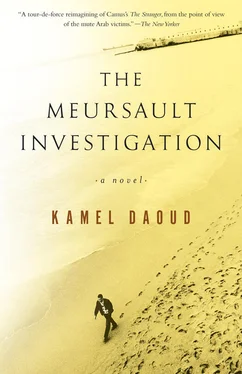And so my brother had to be seen through your hero’s eyes in order to become an “Arab” and consequently die. On that miserable morning in the summer of 1942 — as I’ve already mentioned several times — Musa had announced that he’d be home earlier than usual. Which annoyed me a little, because it meant I’d have less time for playing in the street. Musa was wearing his blue overalls and his espadrilles. He drank his café au lait, looked at the walls the way people today browse through their phones, and then suddenly stood up, maybe after coming to a definitive decision about his schedule and the hour of his rendezvous with some friends. Every day, or almost, went the same way: a foray in the morning, followed — if there was no work at the port or in the market — by long hours of idleness. Musa slammed the door behind him, leaving my mother’s question unanswered: “Will you bring home some bread?”
One point in particular keeps nagging at me: How did my brother end up on that beach? We’ll never know. That detail’s an immeasurable mystery. You can get dizzy thinking about it and then wondering how a man could lose his name, plus his life, plus his own corpse, all in a single day. Yes, that’s it, basically. This story — I’m going to allow myself to get a little bombastic here — it’s everybody’s story these days. He was Musa to us, his family, his neighbors, but it was enough for him to venture a few meters into the French part of the city, a single glance from one of them was enough, to make him lose everything, starting with his name, which went floating off into some blind spot in the landscape. In fact, Musa didn’t do anything that day but get too close to the sun, in a way. He was supposed to meet one of his friends, a certain Larbi, who as I recall played the flute. Incidentally, he’s never been found, this Larbi guy. He vanished from the neighborhood to avoid my mother, the police, the whole story, and even the story in your book. All that’s left of him is his first name, which makes an odd echo: Larbi l’Arabe, Larbi the Arab. But he’s a false twin, he couldn’t be more anonymous … Oh, right, there’s still the prostitute! I never talk about her, because her part is truly insulting. It’s a tall tale invented by your hero. Did he have to make up such an improbable story, a working whore whose brother wanted to avenge her? I acknowledge that your hero had the talent to create a tragedy out of a newspaper clipping and bring a mad emperor to life out of a fire, but I confess, he disappointed me there. Why a whore? To insult Musa’s memory, to smear him and thus diminish the gravity of the author’s own misdeed? I’ve come to doubt that. I think rather that his twisted mind conceived some abstract characters. This country, our land, in the form of two imaginary women: the famous Marie, brought up in a greenhouse of impossible innocence, and the alleged sister of Musa alias Zujj, a distant symbol of our land, plowed by customers and passersby, reduced to dependence on an immoral, violent pimp. A whore whose honor her Arab brother feels himself duty-bound to avenge. If you had met me a few decades ago, I would have served you up the version with the prostitute slash Algerian land and the settler who abuses her with repeated rapes and violence. But I’ve gained some distance now. We never had a sister, my brother Zujj and I, period.
I can’t help wondering, over and over, what was Musa doing on that beach that day? I don’t know. Idleness is an easy explanation, and blaming it on destiny is too pompous. Maybe the proper question, after all, is the following: What was your hero doing on that beach? And not only that day but every day, going a long way back! A century, to be frank. No, believe me, I’m not one of those. It doesn’t matter that he was French and I’m Algerian, except that Musa was on the beach first, and it was your hero who came looking for him. Reread the paragraph in the book. He himself admits he was slightly lost when they came upon the two Arabs, almost by chance. What I mean to say is, your hero had a life that shouldn’t have led him to such murderous idleness. He was starting to get famous, he was young and free, he had a paying job, and he was capable of seeing things as they are. He should have moved to Paris by then, or married Marie. Why did he go to that very beach on that very day? What’s inexplicable is not only the murder but also the fellow’s life. He’s a corpse that magnificently describes the quality of the light in this country while stuck in some hereafter with no gods and no hells. Nothing but blinding routine. His life? If he hadn’t killed and written, nobody would have remembered him.
I want some more to drink. Call him.
Hey, Musa!
It was already the case some years ago, and it’s still the case today: When I add things up and go over my lists, I’m always a little surprised. In the first place, the beach doesn’t really exist, and also there’s Musa’s alleged sister, who’s either an allegory or just a pathetic last-minute excuse. And then there are the witnesses: One by one, they turn out to be pseudonyms, or not really neighbors, or memories, or people who fled after the crime. My list is down to two couples and an orphan. On one side, your Meursault and his mother; on the other, Mama and Musa; and right in the middle, unable to be the son of either, me, sitting in this bar and trying to hold your attention.
Judging from your enthusiasm, the book’s success is still undiminished, but I repeat, I think it’s an awful swindle. After Independence, the more I read of your hero’s work, the more I had the feeling I was pressing my face against the window of a big room where a party was going on that neither my mother nor I had been invited to. Everything happened without us. There’s not a trace of our loss or of what became of us afterward. Not a single trace, my friend! The whole world eternally witnesses the same murder in the blazing sun, but no one saw anything, and no one watched us recede into the distance. No one! There’s good reason to get a little angry, don’t you think? If only your hero had been content with bragging, without going so far as to write a book! There were thousands like him back then, but it was his talent that made his crime perfect.
Say, the ghost is absent again this evening. Two nights in a row. He must be conducting the dead, or reading books nobody understands.
No, thanks, no café au lait for me! I despise that concoction.
Actually, it’s Fridays I don’t like. I often spend them on the balcony of my apartment, looking at the people, the streets, and the mosque. It’s so imposing, it’s as though it prevents you from seeing God. I’ve lived there — I’m on the fourth floor — for twenty years now, I think. The whole place is falling into ruin. When I lean over my balcony and observe young children playing, it seems like I’m watching a live broadcast of the new generations, in ever-increasing numbers, as they push the old ones toward the edge of the cliff. It’s shameful, but I feel hatred when I see them. They’re stealing something from me. I slept very badly last night.
My neighbor’s an invisible man who takes it upon himself, every weekend, to read the Koran at the top of his voice all night long. Nobody dares tell him to stop, because it’s God who’s making him shout. I myself don’t dare, I’m marginal enough in this city as it is. His voice is nasal, plaintive, and obsequious. It sounds as if he’s alternating roles, from torturer to victim and back. I always react that way when I hear someone recite the Koran. I get the feeling it’s not a book, it’s a dispute between a heaven and a creature! As far as I’m concerned, religion is public transportation I never use. This God — I like traveling in his direction, on foot if necessary, but I don’t want to take an organized trip. I’ve loathed Fridays ever since Independence, I think. Am I a believer? I’ve dealt with the heaven question by recognizing the obvious: I realized very young that among all those who nattered on about my condition, whether angels, gods, devils, or books, I was the only one who knew the sorrow and obligation of death, work, and sickness. I alone pay the electric bill, I alone will be eaten by worms in the end. So get lost! And therefore I detest religions and submission. Who wants to run panting after a father who has never set foot on earth, has never had to know hunger or work for a living?
Читать дальше












